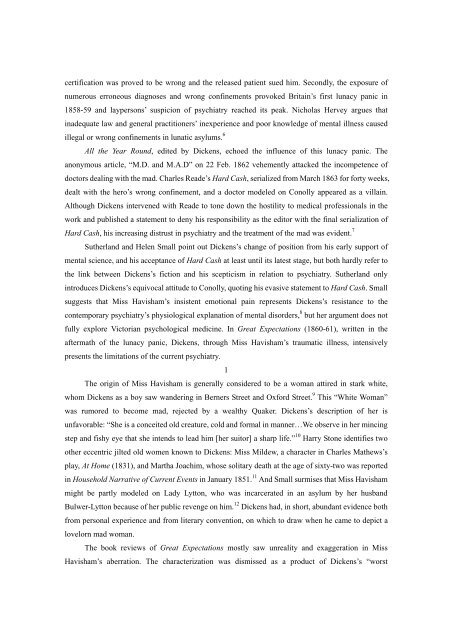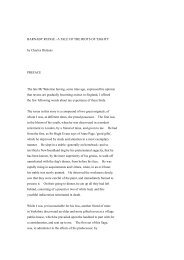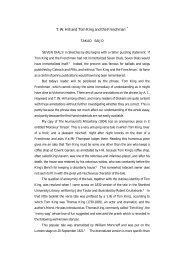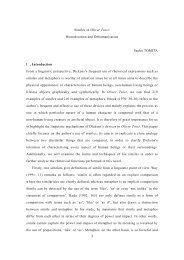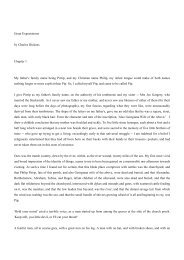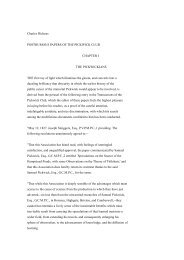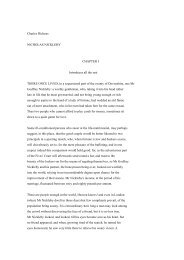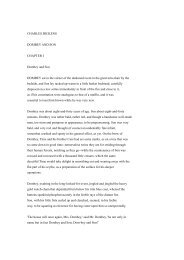Miss Havisham and Victorian Psychiatry
Miss Havisham and Victorian Psychiatry
Miss Havisham and Victorian Psychiatry
- No tags were found...
You also want an ePaper? Increase the reach of your titles
YUMPU automatically turns print PDFs into web optimized ePapers that Google loves.
certification was proved to be wrong <strong>and</strong> the released patient sued him. Secondly, the exposure of<br />
numerous erroneous diagnoses <strong>and</strong> wrong confinements provoked Britain’s first lunacy panic in<br />
1858-59 <strong>and</strong> laypersons’ suspicion of psychiatry reached its peak. Nicholas Hervey argues that<br />
inadequate law <strong>and</strong> general practitioners’ inexperience <strong>and</strong> poor knowledge of mental illness caused<br />
illegal or wrong confinements in lunatic asylums. 6<br />
All the Year Round, edited by Dickens, echoed the influence of this lunacy panic. The<br />
anonymous article, “M.D. <strong>and</strong> M.A.D” on 22 Feb. 1862 vehemently attacked the incompetence of<br />
doctors dealing with the mad. Charles Reade’s Hard Cash, serialized from March 1863 for forty weeks,<br />
dealt with the hero’s wrong confinement, <strong>and</strong> a doctor modeled on Conolly appeared as a villain.<br />
Although Dickens intervened with Reade to tone down the hostility to medical professionals in the<br />
work <strong>and</strong> published a statement to deny his responsibility as the editor with the final serialization of<br />
Hard Cash, his increasing distrust in psychiatry <strong>and</strong> the treatment of the mad was evident. 7<br />
Sutherl<strong>and</strong> <strong>and</strong> Helen Small point out Dickens’s change of position from his early support of<br />
mental science, <strong>and</strong> his acceptance of Hard Cash at least until its latest stage, but both hardly refer to<br />
the link between Dickens’s fiction <strong>and</strong> his scepticism in relation to psychiatry. Sutherl<strong>and</strong> only<br />
introduces Dickens’s equivocal attitude to Conolly, quoting his evasive statement to Hard Cash. Small<br />
suggests that <strong>Miss</strong> <strong>Havisham</strong>’s insistent emotional pain represents Dickens’s resistance to the<br />
contemporary psychiatry’s physiological explanation of mental disorders, 8 but her argument does not<br />
fully explore <strong>Victorian</strong> psychological medicine. In Great Expectations (1860-61), written in the<br />
aftermath of the lunacy panic, Dickens, through <strong>Miss</strong> <strong>Havisham</strong>’s traumatic illness, intensively<br />
presents the limitations of the current psychiatry.<br />
1<br />
The origin of <strong>Miss</strong> <strong>Havisham</strong> is generally considered to be a woman attired in stark white,<br />
whom Dickens as a boy saw w<strong>and</strong>ering in Berners Street <strong>and</strong> Oxford Street. 9 This “White Woman”<br />
was rumored to become mad, rejected by a wealthy Quaker. Dickens’s description of her is<br />
unfavorable: “She is a conceited old creature, cold <strong>and</strong> formal in manner…We observe in her mincing<br />
step <strong>and</strong> fishy eye that she intends to lead him [her suitor] a sharp life.” 10 Harry Stone identifies two<br />
other eccentric jilted old women known to Dickens: <strong>Miss</strong> Mildew, a character in Charles Mathews’s<br />
play, At Home (1831), <strong>and</strong> Martha Joachim, whose solitary death at the age of sixty-two was reported<br />
in Household Narrative of Current Events in January 1851. 11 And Small surmises that <strong>Miss</strong> <strong>Havisham</strong><br />
might be partly modeled on Lady Lytton, who was incarcerated in an asylum by her husb<strong>and</strong><br />
Bulwer-Lytton because of her public revenge on him. 12 Dickens had, in short, abundant evidence both<br />
from personal experience <strong>and</strong> from literary convention, on which to draw when he came to depict a<br />
lovelorn mad woman.<br />
The book reviews of Great Expectations mostly saw unreality <strong>and</strong> exaggeration in <strong>Miss</strong><br />
<strong>Havisham</strong>’s aberration. The characterization was dismissed as a product of Dickens’s “worst


